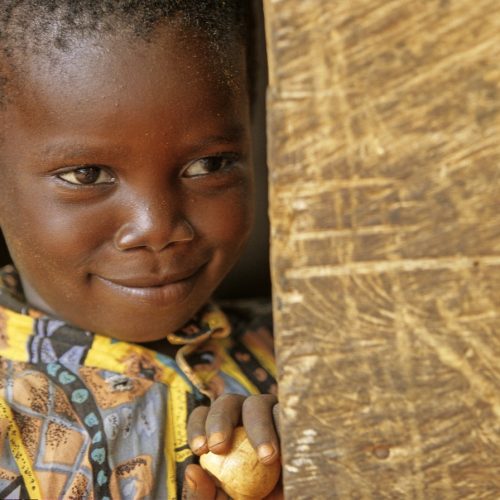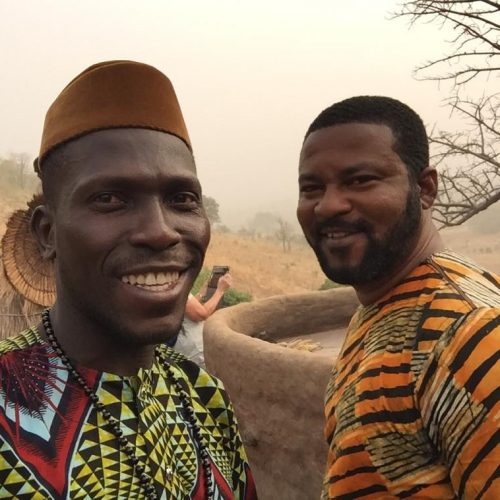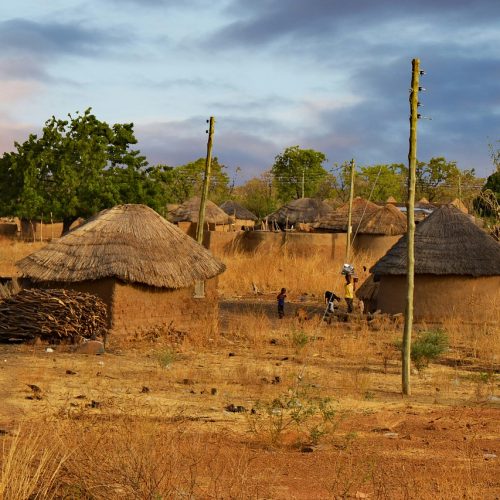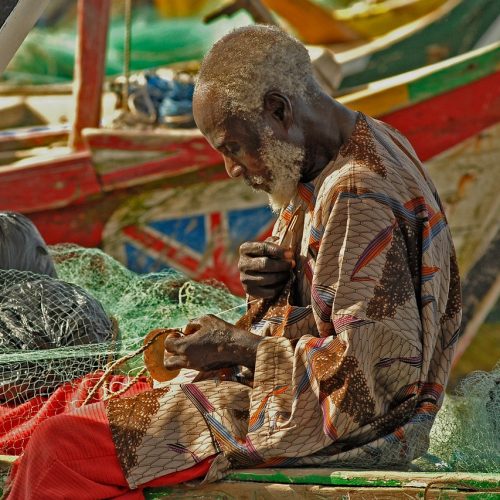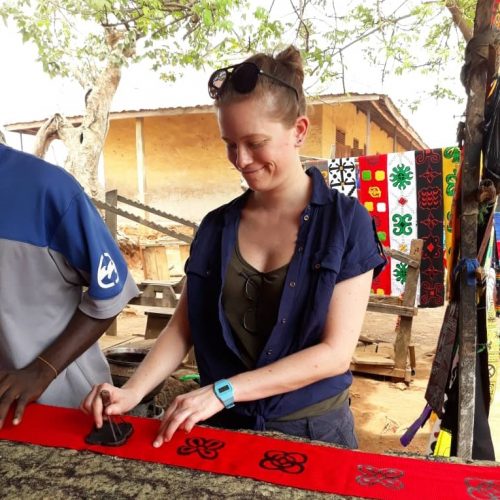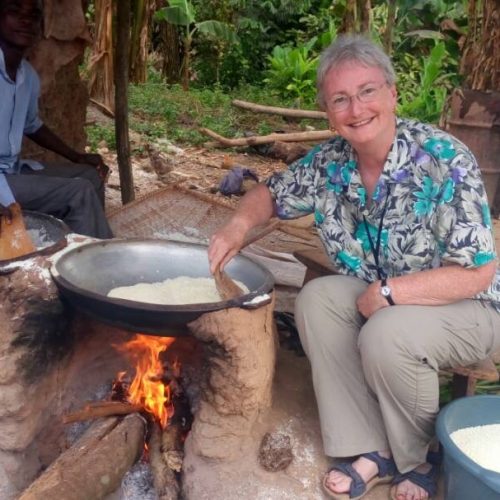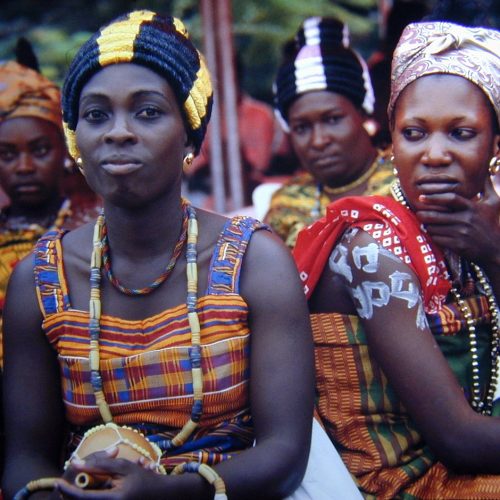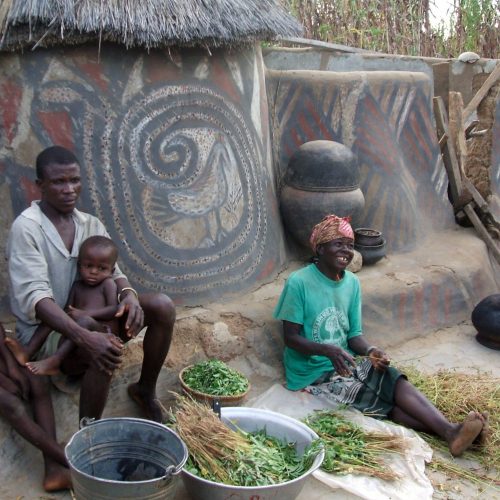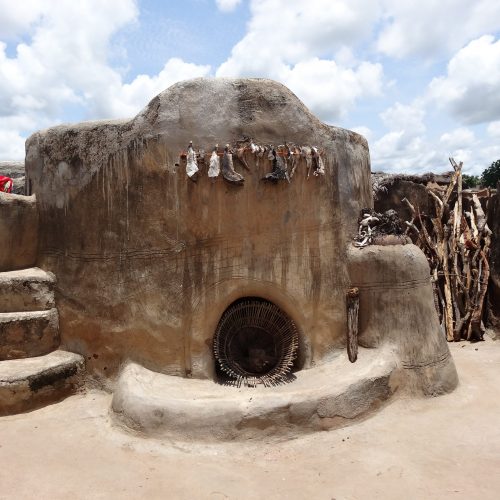If you would like to experience life how it is for the locals during your time in Ghana and not just follow the well-trodden tourist routes, then our
“The Best of Ghana” tour is perfect for you.
Mixing with the locals at every opportunity and experiencing daily life in this wonderfully welcoming country with expert local guides, opens doors and experiences that will create memories that last a lifetime. Mixing everyday experiences with ancient cultural sites of interest, beautiful beaches, learning about the dark historical past and exceptional flora and fauna makes this the perfect trip of a lifetime!
confort level
physical effort
cultural impact
TRIP DETAILS
ACCRA | Krobo | WLI | Akosombo | Kumasi Bonkro | Brenu Akyinim | Ankasa
CULTURAL | ECOTOURISM
FLIGHT NOT INCLUDED
13 nights of accommodation (ALL INCLUDED)
bus | 4×4 LANDROVER
hat, camera, insect repeller, sunscreen
DBL ROOM SGL ROOM
2340€* | 2795 € *
*Price depends on the number of participants
ITINERARY
Our local guide will meet with you at the Kotoka International Airport Accra. Make yourself known to your guides who will be accompanying you for the duration of your time in Ghana and they will take care of you from here. After boarding our vehicle, which will be your mode of transport for the duration of your tour, we transfer you to your accommodation which is situated in Accra. Most flights arrive in the late evenings as such after we checked you in, our experienced guide will offer you Akwaaba (welcome) and brief you on all aspects of your trip. You can enjoy your evening meal at the hotel restaurant whilst acclimatizing yourself to West Africa.
Accommodation: Accra
A relaxed morning as we allow the rush hour traffic to pass before setting off to Makola Market, one of Accra´s best local markets. We can choose to miss or have a light breakfast at our accommodation as it would be great to experience one of the local street foods Ghanaians eat here for breakfast. Traders sell almost anything here from local herbal remedies, traditional cloth, jewelry and food to mobile phones, televisions, and sound systems. Do not forget to barter!
There are some wonderful local artists in Ghana and it would be a real treat to see some of their work. The Artist Alliance Gallery on the beach front in Accra is the ideal location to experience traditional and contemporary art and artifacts ranging from paintings, carvings, furniture, jewelry, fabrics and photography from all of Ghana and neighboring countries.
Funeral and burial ceremonies in Ghana are very solemn occasions, but after the burial a celebration follows. Ghanaians believe that the departed move on into another world and the coffins made here may represent the occupation of the deceased or depict something that was important to them. During our time here we can venture to their workshops and meet the coffin makers. There are all manner of coffin designs, what would you choose to be buried in?
In the afternoon we pass by Black Star Square which houses the independence monument and continue to Independent Square, which was lit by Kwame Nkrumah himself in 1961. A short distance away we find the Kwame Nkrumah Memorial Park, final resting place of Ghana´s founder.
A fascinating afternoon and evening is in store for us as we head downtown to Jamestown, one of the oldest suburbs of Accra. The locals are committed to conserving the old buildings and historical structures that predate the colonial era, which give us an excellent idea of what it was like during that time. Our evening will be also dedicated to meeting locals who are trying to change the lives of the youth through boxing, as boxing is giving hope and teaching discipline to many street children and orphans in this poor community. Jamestown is famous in Ghana for producing several World Champion Boxers.
Accommodation: Accra
A more relaxed breakfast before we head out to Krobo. Here the people are known for their traditional bead jewelry that dates back centuries. Many families in Krobo communities make beautiful beads and we will dedicate a few hours visiting one to have a go at producing our own beads. Beads are culturally a symbol of wealth and beauty and are still used during traditional durbars and festivals.
Our journey continues to the Volta Region, as we cross the White Volta River and head towards Wli, stopping for lunch at a restaurant overlooking this stunning river. After checking into our accommodation in Wli we set off for the Wli Waterfalls in the Agumatsa wildlife sanctuary in the Volta Region of Ghana. There we can relax and enjoy a paddle or hike to the upper falls before returning to our accommodation for an evening of relaxation.
Accommodation: Wli
An early start after breakfast as we set off to Mount Afajato. Our morning will be dedicated to hiking Ghana´s highest mountain Afajato with approximately 885 meters. Our guides are experts in butterflies, birds and all of Ghana´s flora and fauna and during your walk they can share with you the exceptional nature that occurs in this part of Ghana.
The afternoon is spent with the locals from the village of Tafi Atome, a wonderful community protecting a population of endangered True Mona monkeys. These animals are considered sacred messengers from the gods and the community has been protecting the monkeys and their habitat for over 200 years. We venture into the surrounding forests to see these beautiful primates and during the walk our local guide will identify the many medicinal plants that grow there and explain how the locals use them to make traditional herbal remedies.
We check into our accommodation on the banks of the White Volta River to relax for the evening.
Accommodation: Akosombo
An early start this morning after breakfast as we set off to Kumasi. Our journey today will take us into the beautiful Akuapem hills with outstanding views across Accra and Tema in the distance. Ate the top of the range, we find the Aburi Botanical Gardens, set in a beautiful location that were founded by the British in 1890. During the walk around the gardens your guide will identify the many trees and plants found here. There are several rare butterflies found here and birds are also in abundance. A short distance from the gardens we find the relaxed and friendly Aburi Craft village, where traditional African drums, sculptures and other crafts have been carved for generations.
Our lunch will be taken in Koforidua, famous for its traditional bead market and a must before we set off on the final leg of our journey wo Kumasi, home of the Asantehene, King of the powerful Ashanti empire. On reaching Kumasi, we check into our hotel.
Accommodation: Kumasi
Today we mix old and new as we travel back in time visiting some of the ancient communities famous for producing local cloth designs and later the day, we also meet new young vibrant designers who are putting Ghana on the map for fashion.
We start by visiting the traditional villages of Adanwomasie and Ntonso. Adanwomasie produces some of Ghana´s finest Kente cloth, and as we walk through the community, interacting with the locals, we learn about the history behind the many designs and see skilled weavers using traditional looms that have not changed in design for centuries.
Our next stop is at the ancient village of Ntonso, where adinkra cloth and symbols originate. During our time there we learn the meanings behind the various symbols, and we can make our own strip of adinkra cloth using symbols with personal significance.
Many of the big businesses in Kumasi are owned by women and for our lunch we will visit an example of that, a very successful local restaurant.
After lunch we head to Adum, the commercial center of Kumasi where most Ghanaians shop. Our afternoon is dedicated to exploring Adum and walking down to Kejetia market which is reported to be the largest outdoor market in West Africa.
In the evening we can rest at our accommodation, or we could head into town to experience local nightlife and music in Kumasi.
Accommodation: Kumasi
A morning of culture and history awaits us as we set off early heading to the Manhyia Palace, home of the Asantehene King of the Ashanti´s and ruler of the powerful Asanteman Kingdom. The Palace Museum offers a fascinating excursion through the history of this powerful tribe.
After this morning we head south to the villages of Bonkro and Breku. Our aim is to reach these remote communities in time for lunch which will be prepared in the village by a local chef. We will visit the local school that was built recently thanks to ethical tourism, connecting these remote areas, where children were not starting kindergarten until they were almost 10 years old as their parents felt they were too young and small to walk the 12km each day along remote roads.
Most Ghanaians live in remote communities and work as subsistence farmers with some having larger farms growing cocoa, palm oil, citrus or rubber trees.
We will meet the local represent of a Fair-Trade organization Cooperative, several farmers and their families and we will also visit one of the local cocoa farms, getting to know the entire harvesting process, hear how the children use the unripe cocoa as their local sweets (not tasting one would be rude) and learn how the locals use the cocoa pods to make soap amongst other uses. After a wonderful day our evening is spent with the community as we relax at our accommodation and enjoy our evening meal whilst experiencing village life in this remote part of Ghana.
Accommodation: Bonkro
An early start as we head to our kitchen to assist our cooks in preparing a local breakfast for us all. During breakfast we will decide which local dishes we would like to learn to cook, as we have been in Ghana for over a week, we are certain you will have a local favorite which our chefs will be happy to teach you how to prepare. After the chef gives us the full list of ingredients and enough money for you to buy them, we will head to the local markets to purchase ingredients for dinner. There is no better way to experience life for a local than immerse ourselves in daily life, mixing in the markets, bartering for products and then heading back to the village to prepare a local meal. Lunch will be taken in a local chop bar (local restaurant) in town.
If cooking lessons are of no interest to you then there are still lots, you can get involved in. As part of our conservation of the rainforest in this location we can arrange for you to assist in planting indigenous trees as a part of our reforestation project. Or you can assist the locals producing Gari, one of their main sources of income, and learning how to prepare it to be sent to the local market for sale. Another options is to assist the extraction process of palm oil, which is used locally to prepare certain dishes.
Our evening meal is taken around and open bonfire, listening to local stories, music and mixing with the community.
Accommodation: Bonkro
After breakfast in the village, we set off Southwards towards Elmina in the central region of Ghana. The town of Elmina was given its name by the Portuguese, due to the abundance of gold found in Ghana, that’s why even before independence Ghana was known as Gold Coast. Today this country is the 8ths largest gold exporter worldwide and the second largest in Africa.
We stop at Assin Manso, an important town along the enslaved African trade routes. The town surrounds the Ndonkor Nsuo (Enslaved African River).
After our visit to the river, we make our way to Cape Coast using the same route the slaves were forced to make not so long ago. The Cape Coast Castle has been designated as a world heritage site by UNESCO. Quality time will be spent in the late morning on an emotional journey touring this castle which held more enslaved African’s captive than any other in West Africa, viewing the dungeons and the infamous “Door of no Return”. There is a historical museum inside, which explains the entire history.
The fishing communities surrounding the castle are some of the poorest in Cape Coast, many children sleep on the streets, do not attend school and girls become very vulnerable as they have no safe place to stay. Our lunch today will be taken at a wonderful organization in this community that is giving these children hope for a better future, teaching them reading, writing, calculating, vocational skills, setting these children up to become self-sufficient and able to support themselves in the future.
Our afternoon is spent immersing ourselves into true African art during a traditional batik making workshop with Global Mamas, an excellent organization empowering local women to learn artistic skills selling their finished products in the fair-trade market enabling them to support their families. There is no better way to get to know locals and hear how life is there than by working side by side with them and making our own traditional batik garment, which you can take back home, a wonderful souvenir!
After a day with so many varied experiences, from tropical forests of inland Ghana to the beautiful coastal communities we set off to our beach front accommodation to relax for the evening.
Accommodation: Brenu Akyinim
An action-packed day lies ahead and an early start for us as we enjoy the sunrise and our breakfast on arguably Ghana´s finest beach front location. Africa´s world-famous rainforest canopy walkaway awaits us as we set off to Kakum National Park. Prepare to take a deep breath as you walk the suspended bridges. Over 40 different mammal species have been recorded within the park, which includes forest elephants, leopards and 6 primate species.
A short distance from Kakum and on the border of the forest we find the International Stingless Bee Project. There have been approximately 9 species of stingless bees identified in Ghana and their importance to our eco system is paramount. We will learn the importance of bees locally, their medicinal qualities and we get to see their hives, taste and buy quality stingless bee honey. There is a stingless bee walkaway and butterfly garden where many of the forest butterfly species come to feed.
The surrounding habitat outside the forest in mainly Palm plantations and Cocoa farms. Globally palm plantations are having a devastating effect on rainforest habitat as locals and international companies’ clear forests to plant their plantations. Palm oil is found in almost 50% of products in our superstores sold globally, so it´s a major concern and alternatives nee to be found. Unfortunately, most of the big international companies’ palm plantations are in developing poor countries where they can exploit locals and have less restrictions on habitat destruction. Ghanaians have several traditional uses for the palm tree, and we will visit a local farm to see firsthand why locally palm is so popular.
A common sight in Ghana is seeing locals tapping palm trees for a popular low alcoholic drink – palm wine. Once a palm plantation has reached its prime the farmer will sell the individual palm trees to distillers who tap them for palm wine which is a local low alcoholic drink of approximately 3% proof. The distiller´s main income from the tree comes from distilling Akpeteshi a local hard gin of varying strengths believed to be around 70% proof. The strength has given it the name Akpeteshi which translates as “kill me quick”, one taste and you will understand why.
We stop for lunch as Han´s cottage Botel near Kakum, built over a lake containing Nile crocodiles and set in a beautiful location surrounded by tropical guinea rainforest. It is an original and comfortable establishment, which is teeming with bird life and an excellent place to enjoy lunch before setting off for an afternoon of relaxation at our accommodation that is positioned on one of Ghana´s finest beach front locations.
Accommodation: Brenu Akyinim
After breakfast on the beach front, we set off westwards towards the Ivory Coast border and Ankasa Reserve. As our accommodation is less than a 5 minutes’ walk away, this is the perfect opportunity to visit the local community and one of the schools we have been able to build through responsibly minded traveler like yourselves. Giving back to communities in need is one of our main goals. If you have any donations or school supplies, you would like to give out during your time in Ghana then this is a good opportunity to do so.
After meeting the children, we set off towards Ankasa Reserve. Our aim is to reach Beyin in time for lunch prior to setting off through the beautiful Amasuri wetlands in traditional dugout canoe to find the community of Nzulezu Stilt Village.
Legend says that the community here migrated from Watala part of the ancient Ghanaian Empire 600 years ago, after being driven from their homes during conflict. A snail led them to this remote location where they would be safe, and the community decided to build their homes over the lake for additional protection. The snail is now sacred to this community and is not eaten here as it is in other parts of Ghana. The boat ride is a major highlight as the wetlands are beautiful, marshy swamps now recognized as globally important wetlands for birds.
Finally wet set off towards Ankasa Reserve which is connected to the Nini-Suhien National Park and protects and area of over 500 square kms of mostly pristine wet evergreen upper guinea rainforest. By far Ghana´s finest remaining rainforest habitat this area protects many endangered mammals and is home to so many wonderful birds and wildlife. On our arrival we check into our accommodation and there will be an option for a night walk inside the forest or you can just relax at your accommodation.
Accommodation: Ankasa
A beautiful morning waking up so close to nature near this wonderful forest habitat. We will visit the stunning Bamboo Cathedral located approximately 12km inside the forest from the main entrance gate. We have two options in getting to this remote location, the first one is by mountain bike or using one of the 4×4 vehicles at the accommodation we are lodging. A full morning is dedicated to being inside the forest, your guides are on hand to identify any bird or mammals we may come across.
Lunch will be back at our accommodation where we can relax.
Our afternoon is dedicated to spending time in this community, visiting the local school and meeting with farmers that live here. This is an area few foreigners visit and experiencing making a local delicacy like Gari, pounding FuFu and visiting local chop bar or drinking spot is also a highlight and insight into where people meet to socialize. Ghana is the world´s second largest exporter of cocoa and during our time in the community one of the farmers take us to his farm to show us the entire process from planting, maintaining, and harvesting. It will be an relaxed afternoon spend in the village, but if you would like to be more active, we can also arrange an afternoon biking around the surrounding area or to walk a trail in the forest looking for wildlife.
Accommodation: Ankasa
We set off back Eastwards after a relaxed breakfast. On arrival we head to our beach front accommodation with the remainder of the afternoon free time to relax on the beach or visit some of the local coastal villages. As the sun starts to set, we arrange an area to eat on the beachfront and enjoy our evening meal around a bonfire. A special treat has been arranged as we have a traditional Ghanaian drumming and dance troupe to join us. Historically traditional music and dance tells a story, and we get an insight into the meaning behind some of the more popular ones. We will try our hand at drumming, learning the basics, whilst overlooking the beautiful coast of West Africa. A perfect way to spend our evening.
Accommodation: Brenu Akyinim
This morning we set off back towards Accra. A few hours free time to explore Elmina fishing town, where we can visit the fishing market and walk the short distance to visit the boat builders in this community. Almost all fishing boats used in this bustling fishing community are traditional wooden boats. Their design has not changed in centuries and neither have the tools and methods used to build them.
Our journey continues towards Accra stopping at Winneba for lunch. On arrival we may have time to head to the Accra Mall to give you an insight into modern day Ghana.
Our early evening meal will be taken at a locally owned restaurant. After your meal our team will transfer you to the airport for your departure after a wonderful time with us experiencing the real Ghana.
Departure.
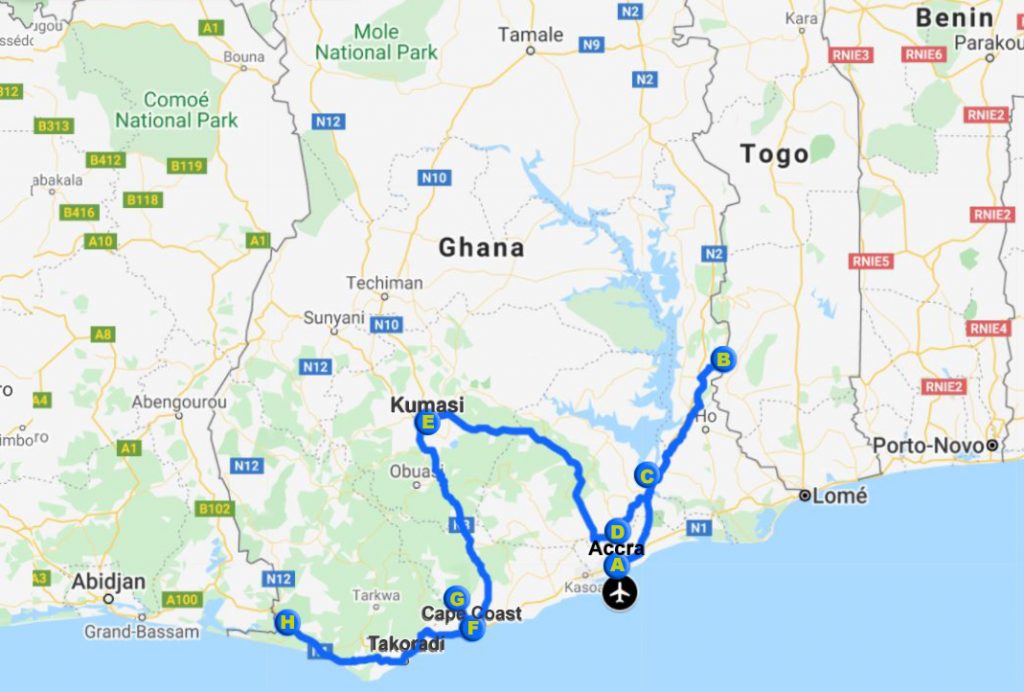
What you say about us
INCLUDED
- Airport Transfer
- Accommodation
- All meals: Breakfast, Lunch, Dinner
- Mineral Water: unlimited and available to every participant for the duration of the tour
- Fruits and Snacks on our vehicle
- Transportation for the duration of your tour in an air-conditioned vehicle
- Experienced and safe dedicated driver
- Fuel
- 4×4 Landrover vehicles getting us deeper inside Ankasa Reserve
- Use of our private, staffed camp inside Ankasa with toilets showers and electricity
- All park entrance, site guide and excursion fees
- Expert Birding Guide fees: fully escorted by Ghana’s finest professional and expert, cultural, birding and nature guides who know all birds by song/call and where to find them
- Professional care, attention 24/7 office support
NOT INCLUDED
- International flights
- Visa
- Alcoholic and soft drinks
- Travel insurance
Got a Question?
F.A.Qs
Yes, you need both. Visas need to be obtained before arriving, these allow for a stay of up to 60 days and can be a single or multiple entry. A Yellow Fever certificate may be required for the application. Visas must be used within three months of the date of issue.
The only immunization you are required to have is for Yellow Fever. All the others are optional, so the best thing to do is to talk to your doctor or a travel medicine clinician about it.
Absolutely. All passengers traveling with Get Lost Tourism are required to purchase travel insurance before the start of your trip. Due to the varying nature, availability and cost of health care around the world, travel insurance is very much an essential and necessary part of every journey.
Yes, we can purchase the flights for you.
Yes, just talk to us and we will arrange it for you.
Fresh produce is plentiful in Accra, and you will see/hear hawkers selling bananas, peanuts (ground nuts), pineapple, oranges (they are green here), apples (imported from South Africa), pawpaw (papaya) and mango. There’s an excellent green grocer across from MaxMart in Cantonments near the Golden Tulip Hotel. There is a wide range of fresh produce available in Accra, less in Kumasi and much less anywhere else. Imported items are generally only sold in Accra, and to a lesser extent Kumasi. Elsewhere you will have to bring your own or be prepared to eat like locals, including “bush meat”. Don’t eat anything fresh that isn’t cooked or peeled in front of you. Consider purchasing some Milton sterilising powder/tablets/liquid to wash your fresh produce at home or in your hotel before eating.
The big hotels offer local and continental dishes, at hotel prices naturally.
Try some local cuisine such as: light soup with fufu, which is a tomato based soup, typically served with some sort of meat or fish, red-red, (fried sweet plantains with red beans, in palm oil), or palava sauce (egg & spinach) and yam chips. Other traditional foods include: kenkey (fermented corn dough) with fried fish and “shito” (hot pepper, ginger, dried shrimps fried in tomato paste with additional spices) and keta school boys or one man thousand, which are small fried fish, grilled tilapia and banku
Roadside hawkers also sell great snack foods like fried crispy plantain chips, roasted corn, popcorn and fried dough. A Remember, Ghanaian foods are typically spicy, so most everything you order will be spicy, but it is usually mild compared to Indian, Korean or Mexican cuisines.
Be brave, try it all!
Don’t drink water from the tap ever. You can purchase bottled water from most any shop, or pure water sachets from hawkers on the street. And don’t forget about the ice cubes, they have also to be filtered ones!
Ghana is hot and humid all-year round, with the temperature usually around 30 degrees Celsius – the perfect, tropical climate to hit the beach. The most comfortable time for traveling is during the dry season from November to March, when less rain is present. April to October is the wet season with the amount of rainfall varying throughout the country.
Credit cards are used in Ghana, but not all establishments will accept credit. Large hotels, restaurants and tourist service providers usually accept credit cards, but expect smaller operators and shops to accept cash only. Credit card fraud is quite common in Ghana, so take necessary precautions when using it.
ATMs are relatively easy to find in Ghana’s cities and areas frequented by tourists. If traveling through rural and remote areas, be aware that there will be limited access to ATMs. Visa cards are generally the best choice, since other international cards may not be accepted by ATMs in Ghana.
Travelers will be able to access the internet at cyber cafes in Ghana’s large cities and towns frequented by tourists. Expect little to no internet access in remote and rural areas.
Cell phone coverage is generally available in Ghana’s large cities and tourist towns. Rural and remote areas may have less network coverage. Remember to activate global roaming with your service provider before leaving home.
